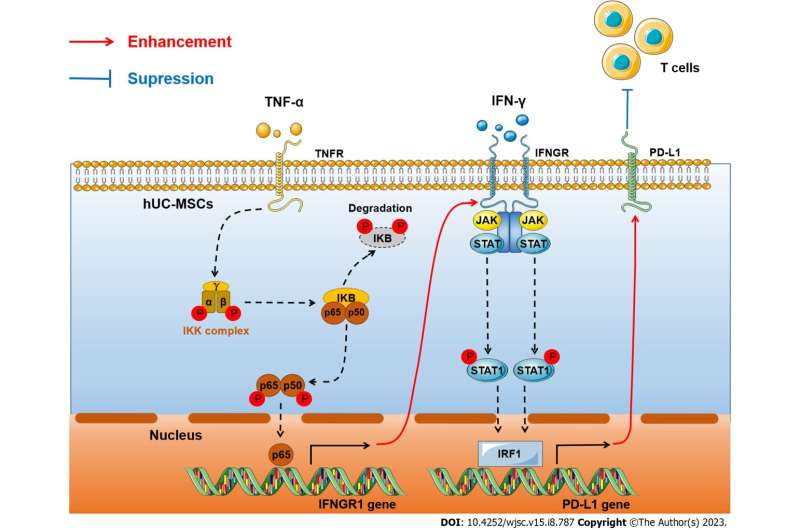This article has been reviewed according to Science X's editorial process and policies. Editors have highlighted the following attributes while ensuring the content's credibility:
fact-checked
proofread
Enhancing the immunosuppressive capacity of human-umbilical-cord–derived mesenchymal stem cells

The immunosuppressive capacity of mesenchymal stem cells (MSCs) is dependent on the "license" of several proinflammatory factors to express immunosuppressive factors such as programmed cell death 1 ligand 1 (PD-L1), which determines the clinical therapeutic efficacy of MSCs for inflammatory or immune diseases. In MSCs, interferon-gamma (IFN-γ) is a key inducer of PD-L1 expression, which is synergistically enhanced by tumor necrosis factor-alpha (TNF-α); however, the underlying mechanism is unclear.
For this study, researchers assessed PD-L1 expression in human umbilical-cord-derived MSCs (hUC-MSCs) induced by IFN-γ and TNF-α, alone or in combination. Additionally, they performed signal pathway inhibitor experiments as well as RNA interference experiments to elucidate the molecular mechanism by which IFN-γ alone or in combination with TNF-α induces PD-L1 expression.
They used luciferase reporter gene experiments to verify the binding sites of the transcription factors of each signal transduction pathway to the targeted gene promoters. Finally, they evaluated the immunosuppressive capacity of hUC-MSCs treated with IFN-γ and TNF-α in both an in vitro mixed lymphocyte culture assay, and in vivo in mice with dextran sulfate sodium-induced acute colitis. The work is published in the World Journal of Stem Cells.
The results suggest that IFN-γ induction alone upregulates PD-L1 expression in hUC-MSCs while TNF-α alone does not, and that the co-induction of IFN-γ and TNF-α promotes higher expression of PD-L1. IFN-γ induces hUC-MSCs to express PD-L1, in which IFN-γ activates the JAK/STAT1 signaling pathway, up-regulates the expression of the interferon regulatory factor 1 (IRF1) transcription factor, promotes the binding of IRF1 and the PD-L1 gene promoter, and finally promotes PD-L1 mRNA.
Although TNF-α alone did not induce PD-L1 expression in hUC-MSCs, the addition of TNF-α significantly enhanced IFN-γ-induced JAK/STAT1/IRF1 activation. TNF-α up-regulated IFN-γ receptor expression through activation of the nuclear factor kappa-B signaling pathway, which significantly enhanced IFN-γ signaling. Finally, co-induced hUC-MSCs have a stronger inhibitory effect on lymphocyte proliferation and significantly ameliorate weight loss, mucosal damage, inflammatory cell infiltration, and up-regulation of inflammatory factors in colitis mice.
Overall, the results suggest that IFN-γ and TNF-α enhance both the immunosuppressive ability of hUC-MSCs and their efficacy in ulcerative colitis by synergistically inducing high expression of PD-L1.
More information: Zhuo Chen et al, Interferon-gamma and tumor necrosis factor-alpha synergistically enhance the immunosuppressive capacity of human umbilical-cord-derived mesenchymal stem cells by increasing PD-L1 expression, World Journal of Stem Cells (2023). DOI: 10.4252/wjsc.v15.i8.787
Provided by World Journal of Stem Cells





















